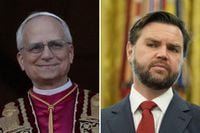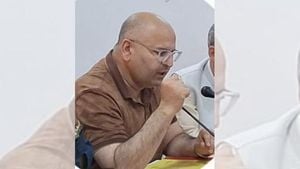In a historic moment for the Catholic Church, Cardinal Robert Prevost was elected as the first American pope, taking the name Leo XIV on May 8, 2025. His election marks a significant shift in the Vatican, as he steps into a role previously dominated by European leaders. However, his past social media posts, particularly those critical of U.S. Vice President JD Vance and the Trump administration's immigration policies, have sparked controversy among conservative circles.
Following his election, Prevost's previous remarks resurfaced, drawing attention to his stance on immigration and love in the context of Christian teachings. In February 2025, he shared an article titled "JD Vance is wrong: Jesus doesn't ask us to rank our love for others," published by Kat Armas in the National Catholic Reporter. This article criticized Vance's interpretation of the Christian concept of love, which the vice president articulated during a Fox News interview on January 29, 2025. Vance had stated, "There's this old school—and I think it's a very Christian concept, by the way—that you love your family and then you love your neighbor, and then you love your community, and then you love your fellow citizens and your own country, and then after that, you can focus and prioritize the rest of the world."
Prevost's retweet of Armas's article challenged this hierarchy, arguing that Jesus's message of love is about abundance rather than scarcity. "Jesus never speaks of love as something to be rationed. He speaks of love as abundance—a table where there is enough for everyone," she wrote.
In April 2025, Prevost shared another article that further critiqued Vance's views, this time from Jesuit priest Sam Sawyer, which highlighted the disconnect between Vance's immigration stance and the teachings of the Church. Sawyer pointed out that many Catholics voted in support of a view on immigration that starkly contrasts with the Church's teachings, suggesting that Prevost's election could reflect a desire for a more compassionate approach towards immigrants.
Despite the backlash from some conservative factions, including a sharp rebuke from Laura Loomer, a close ally of Trump, who labeled Prevost as "anti-Trump, anti-MAGA, and a total Marxist," the new pope's election has been met with enthusiasm from many. Loomer criticized Prevost for his past retweets regarding George Floyd, questioning the appropriateness of his comments on social justice and immigration.
In response to the election, Vance expressed his congratulations on social media, stating, "Congratulations to Leo XIV, the first American Pope, on his election! I'm sure millions of American Catholics and other Christians will pray for his successful work leading the Church. May God bless him!" However, he did not address the resurfaced posts from Prevost that criticized his own immigration policies.
Prevost's election is seen as a pivotal moment, especially as he has been vocal about the need for reform within the Church and has previously criticized the extreme policies of the Republican administration. His comments on social media have raised questions about the future direction of the Church under his leadership, particularly concerning immigration and social justice issues.
The conclave that selected Prevost was marked by intense discussions about the future of the Church, particularly following the death of Pope Francis, who passed away at the age of 88 in April 2025. Prevost, who was born in Chicago in 1955 and ordained as a priest in 1982, has a history of pastoral care and has worked extensively in Latin America. He was elevated to the cardinalate by Francis in 2023, indicating a shared vision for a more inclusive and reform-minded Church.
As Pope Leo XIV, Prevost's authority begins immediately, and his first address from the balcony of St. Peter's Basilica resonated with calls for peace and unity. "Peace be with you all. Dear brothers and sisters, this is the first greeting of the Risen Christ, the good shepherd who gave his life for the flock of God," he said, signaling his desire to lead with compassion and understanding.
Prevost's election also raises questions about the Church's stance on immigration and how it will address the ongoing debates in the U.S. about border policies and humanitarian responsibilities. His previous critiques of Vance’s immigration policies suggest a potential shift towards a more open and welcoming approach to immigrants, aligning with the teachings of Pope Francis.
The election of the first American pope is not just a historic milestone; it also reflects the evolving landscape of the Catholic Church in the United States. As American Catholics grapple with their identity and the Church's role in contemporary issues, Prevost's leadership may offer a new perspective that challenges traditional views and encourages a more inclusive dialogue.
As the world watches, the question remains: how will Pope Leo XIV navigate the complex relationship between faith, politics, and social justice? His past statements indicate a commitment to addressing these issues head-on, but the reactions from various factions within the Church and the broader political landscape will significantly shape his papacy.




